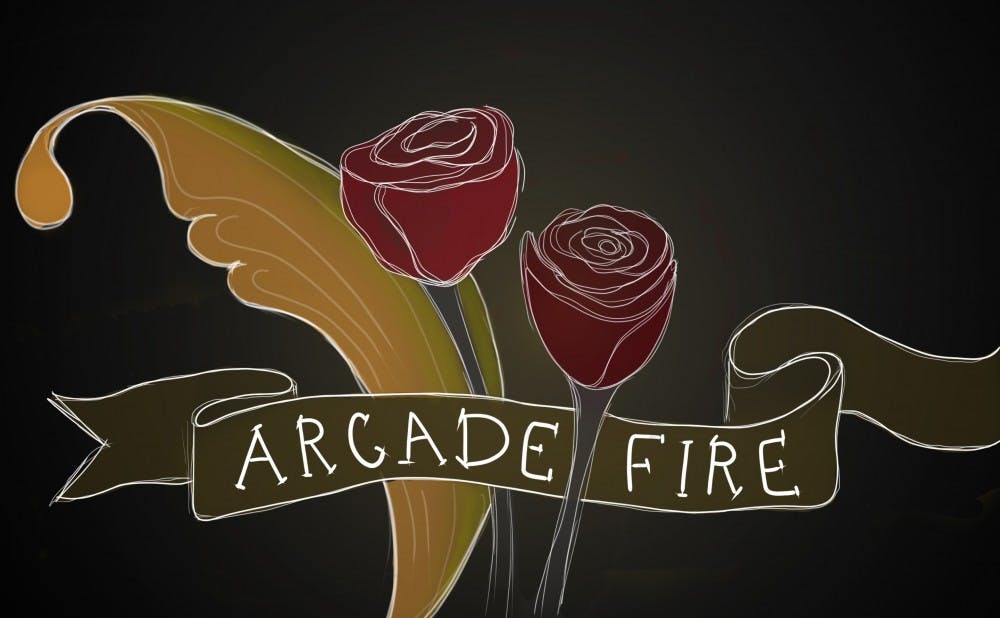When I first discovered Arcade Fire, I hated them with every fiber of my being. I had not heard a second of their music, but my sixth grade self was simply angry that some random indie band from Montreal with an awkward-looking lead singer had “stolen” the Grammy for Album of the Year from the Top 40 artists I listened to at the time. Nowadays, my views are radically different: Arcade Fire is one of my favorite bands, and I have zero interest in Top 40 music.
My shift in music taste is a testament to what Arcade Fire has done for me. The band has broadened my horizons, getting me hooked on other likeminded artists, including The National, The Flaming Lips and of Montreal. The album they won their 2011 Grammy for, “The Suburbs”, remains one of my favorite albums of all time. To me, though, it was never as profoundly moving or worthy of discussion as their debut album, “Funeral.” This album is the crown jewel of their brilliant discography, a triumphant achievement for the band and for the indie rock genre as a whole.
Listening to “Funeral” is an emotional experience due to its themes of death, childhood and suburbia. The album is not one to simply flip on when looking for something to jam out to. Although it does have uplifting notes, specifically about maximizing the joy of life and appreciating those who have moved on, the album is still quite dark, heavily inspired by the loss of a grandparent for band-leaders Win Butler and Régine Chassagne.
The album opens with “Neighborhood #1 (Tunnels),” which became one of my favorite songs of all time. The song tells the story of two young lovers who escape their miserable suburban homes to plan a life together as they struggle to deal with the realities, hardships and decisions of adulthood. It is both substantively somber and sonically thrilling, with an upbeat rhythm that could easily hide the severity of the subject matter if one was not paying attention to the lyrics.
Listening to it on a long drive with two of my best friends during the summer between high school and college really drove its themes home for me. This was a time when I was anxious about planning my life in college and beyond, and I felt lost trying to understand the complexities of the world from my position as a teenager on the cusp of adulthood. The song has actually helped provide me some closure, as I have realized something its protagonists never recognize: It is okay not to have your entire life figured out. Most of the plans I make today will probably not pan out tomorrow.
The decrepit neighborhood theme continues throughout the album, with four songs titled specifically by this subject. One of them, “Neighborhood #3 (Power Out),” is another mesmerizing cut that continues to paint a bleak picture of society. The song envisions the neighborhood in a downturn, with the parents nowhere to be seen, leaving the children without guidance as they grow up. While not necessarily the song’s intended message, this theme could be considered analogous to the situation with climate change, where the previous generation messed up, dooming the new generation. This generation becomes hopeless and immobilized per the lyric in the first verse where they, “Don’t have any dreams don’t have any plans”. The song paints a poignant picture of a depressing society that arguably resembles modern America. Children grow up clueless and lazy, many without guidance from parents who fail to nurture them properly or abandon them altogether.
Other standouts on the record include shimmering anthems “Wake Up” and “Rebellion (Lies)”. Both serve as a call to arms, with the latter calling for maximizing life and not giving into the inevitability of death and the former calling on the youth to, as the name implies, wake up and fight to avoid a dystopian future. These songs show a different side of the album from “Neighborhood #1 (Tunnels)” and “Neighborhood #3 (Power Out),” one of hope even in the midst of despair. This part of the album is anthemic, inspiring and passionate, making “Funeral” a surprisingly optimistic listen that provides a pathway for overcoming grief, sadness and societal damage.
Everyone experiences death and tragedy at one point or another. Similar to Butler and Chassagne, I have had loved ones pass away, and been forced to ponder the purpose of life as a result. I am also part of a generation that has been passed on catastrophic climate change, a political system with institutions being dismantled daily and an economic system rife with greed and a lack of regulation. It can be really hard to grieve in the face of tragedy, to understand your place in the world, especially as a teenager, and to repair a broken society as a new generation. These challenges are immense and can seem immovable. “Funeral” understands that, but also provides a blueprint for the future: celebrate those who have passed, appreciate your life while you still have it and tackle societal issues collectively, using every possible tool.
Get The Chronicle straight to your inbox
Signup for our weekly newsletter. Cancel at any time.

